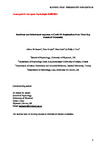Emotional and Behavioural responses to Covid-19: Explanations from Three Key Models of Personality
| dc.contributor.author | Bacon, AM | |
| dc.contributor.author | Krupić, D | |
| dc.contributor.author | Caki, N | |
| dc.contributor.author | Corr, PJ | |
| dc.date.accessioned | 2021-08-05T09:39:52Z | |
| dc.date.issued | 2022-10 | |
| dc.identifier.issn | 0705-5870 | |
| dc.identifier.issn | 1878-531X | |
| dc.identifier.uri | http://hdl.handle.net/10026.1/17391 | |
| dc.description.abstract |
This review appraises evidence for the role of personality in Covid-19 related emotions and behaviours. Three key models of personality are considered: the Five factor Model, HEXACO model and Reinforcement Sensitivity Theory. In line with personality research more generally, most studies focus on the Five-Factor model. Key findings are that neuroticism is most associated with poor mental health, and extraversion is associated with a reluctance to socially isolate. Conscientiousness predicts compliance with safety guidelines, but also with fewer prosocial behaviours, particularly stockpiling. Research within the HEXACO framework largely confirms these findings, especially for emotionality and mental health. The additional HEXACO Honesty-humility factor is found to be associated with prosocial views and abstention from panic buying. Studies based on the Reinforcement Sensitivity Theory of personality indicate the presence of emotional conflict as people wish to stay safe, whilst also maintaining a sense of normality. Behavioural compliance is driven by activation in the Fight-Flight-Freeze System (FFFS; fear-related) and the Behavioural Inhibition System (BIS; anxiety-related). The Behavioural Approach System (BAS) is implicated in approach-driven behaviours such as avoiding infection. These findings have implications for health communications and post-pandemic support. | |
| dc.format.extent | 334-347 | |
| dc.language | en | |
| dc.language.iso | en | |
| dc.publisher | Hogrefe | |
| dc.subject | Reinforcement Sensitivity Theory | |
| dc.subject | Five-Factor model | |
| dc.subject | HEXACO | |
| dc.subject | COVID-19 | |
| dc.subject | mental health | |
| dc.title | Emotional and Behavioural responses to Covid-19: Explanations from Three Key Models of Personality | |
| dc.type | journal-article | |
| dc.type | Article | |
| plymouth.author-url | https://www.webofscience.com/api/gateway?GWVersion=2&SrcApp=PARTNER_APP&SrcAuth=LinksAMR&KeyUT=WOS:000738933600008&DestLinkType=FullRecord&DestApp=ALL_WOS&UsrCustomerID=11bb513d99f797142bcfeffcc58ea008 | |
| plymouth.issue | 4 | |
| plymouth.volume | 26 | |
| plymouth.publication-status | Published | |
| plymouth.journal | European Psychologist | |
| dc.identifier.doi | 10.1027/1016-9040/a000461 | |
| plymouth.organisational-group | /Plymouth | |
| plymouth.organisational-group | /Plymouth/Faculty of Health | |
| plymouth.organisational-group | /Plymouth/Faculty of Health/School of Psychology | |
| plymouth.organisational-group | /Plymouth/REF 2021 Researchers by UoA | |
| plymouth.organisational-group | /Plymouth/REF 2021 Researchers by UoA/UoA04 Psychology, Psychiatry and Neuroscience | |
| plymouth.organisational-group | /Plymouth/REF 2021 Researchers by UoA/UoA04 Psychology, Psychiatry and Neuroscience/UoA04 REF peer reviewers | |
| plymouth.organisational-group | /Plymouth/Research Groups | |
| plymouth.organisational-group | /Plymouth/Research Groups/Centre for Brain, Cognition and Behaviour (CBCB) | |
| plymouth.organisational-group | /Plymouth/Research Groups/Centre for Brain, Cognition and Behaviour (CBCB)/Behaviour | |
| plymouth.organisational-group | /Plymouth/Research Groups/Plymouth Institute of Health and Care Research (PIHR) | |
| plymouth.organisational-group | /Plymouth/Users by role | |
| plymouth.organisational-group | /Plymouth/Users by role/Academics | |
| dcterms.dateAccepted | 2021-08-04 | |
| dc.rights.embargodate | 2022-1-8 | |
| dc.identifier.eissn | 1878-531X | |
| dc.rights.embargoperiod | Not known | |
| rioxxterms.versionofrecord | 10.1027/1016-9040/a000461 | |
| rioxxterms.licenseref.uri | http://www.rioxx.net/licenses/all-rights-reserved | |
| rioxxterms.licenseref.startdate | 2022-10 | |
| rioxxterms.type | Journal Article/Review |


